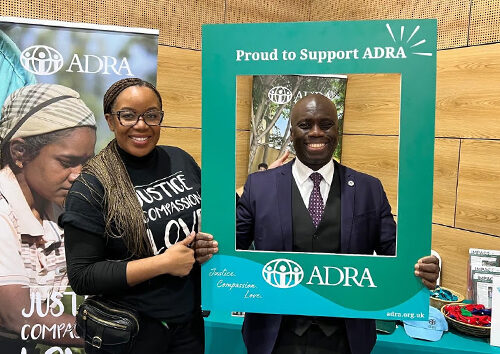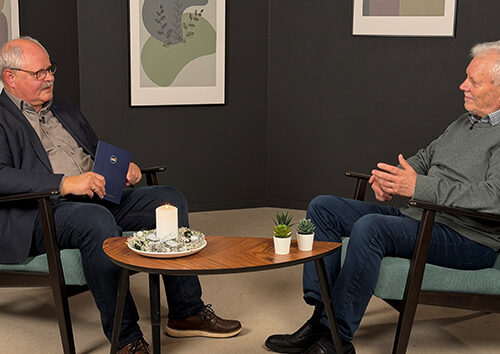19 February 2019 | St Albans [Patrick Johnson] Also availble as Audio podcast.
Many of the world’s problems come from fear of “the other.”
![]() While listening to the radio on my drive to work recently, a couple news stories—as well as their sequence—caught my attention. The first was the report of a senior scientist, speaking at CERN, the European Organization for Nuclear Research based in Geneva, who had given what was described as a “highly offensive” presentation about the role of women in physics. Alessandro Strumia, of Pisa University, said that “physics was invented and built by men, it’s not by invitation.” He went on to assert that male scientists were being discriminated against because of ideology rather than merit.
While listening to the radio on my drive to work recently, a couple news stories—as well as their sequence—caught my attention. The first was the report of a senior scientist, speaking at CERN, the European Organization for Nuclear Research based in Geneva, who had given what was described as a “highly offensive” presentation about the role of women in physics. Alessandro Strumia, of Pisa University, said that “physics was invented and built by men, it’s not by invitation.” He went on to assert that male scientists were being discriminated against because of ideology rather than merit.
As you can imagine, his remarks caused great consternation and drew widespread condemnation across the scientific community.
The following news story, which I’m sure was chosen deliberately by the producers, was about the Nobel Prize in Physics being awarded to Donna Strickland from Canada. This was the first time in 55 years that a woman, together with two male colleagues, had been awarded the prize.
Hearing these two stories back to back was another reminder that even in today’s modern world, we still have a long way to go in overcoming our prejudices and biases and learning to love difference. This is one of the lessons we can learn from the Bible book of Ruth.
The Irony of Life
 The opening line of the book reads, “In the days when the judges ruled” (Ruth 1:1). I regard the book of Judges as one of the most depressing books of the Bible. Not only are some of the Bible’s most disturbing stories in it, it also outlines a dismal, never-ending cycle. Israel’s idolatry; God’s withdrawal; enemy oppression; Israel crying out to God; God sending a judge; revival and reformation that lasts only during the lifetime of the judge.
The opening line of the book reads, “In the days when the judges ruled” (Ruth 1:1). I regard the book of Judges as one of the most depressing books of the Bible. Not only are some of the Bible’s most disturbing stories in it, it also outlines a dismal, never-ending cycle. Israel’s idolatry; God’s withdrawal; enemy oppression; Israel crying out to God; God sending a judge; revival and reformation that lasts only during the lifetime of the judge.
The cycle repeats again and again. To stay positive amid such negative circumstances, God must indeed be a faithful, covenant-keeping God!
The book of Ruth comes as a reminder that even in the darkest times, things are never quite as bleak as one might think. When Elijah thought he was the only person following God, God let him know that 7,000 faithful followers were still loyal to Him (1 Kings 19:18). God always has a remnant, people with whom He can work.
It’s refreshing to note that one of the shining stars in this period of sad darkness was a woman, Ruth, especially considering the horrendous treatment that women are described as receiving in the book of Judges. It’s as if God wants to tell us how He views women by having this book in the Bible bearing the name of a woman.
The book begins during a time of famine (Ruth 1:1, 2). The author seems to play on the irony of some of the names that are used. Not only did famine hit Bethlehem (Hebrew: “house of bread”), Naomi’s family, who were Ephrathites (from the root word meaning “fruitful”), ends up without fruit (her husband dies and his sons die childless). So Naomi, whose name means “pleasant” or “my delight,” wants to be known as Mara, which means “bitter” (verses 19, 20). We can all empathize with Naomi that life is indeed a bitter-sweet experience. Living on this side of the second advent we have to remember that our lives will always contain a mixture of good and bad.
Only as we learn to value and welcome God’s difference will we have a deep appreciation and love for Him.
But the main lesson to focus on in Ruth is to examine how we deal with difference. Ruth is a Moabite, that is, a descendant of the incestuous relationship between Lot and one of his daughters (Gen. 19:37), which meant that she was from a despised race of people. How do we deal with people like that? The book of Ruth gives us three suggestions.
The Difficulty of Difference
It’s difficult to welcome difference. In Ruth 1 Naomi tries to send her daughters-in-law back to their original home (verses 8, 11, 12). She was aware that as foreigners they would have no future in Israel. Interestingly, a Jewish tradition says that since Naomi told them to go home three times, this should be used as a pattern for testing the sincerity of converts to Judaism, repulsing them three times. I wonder what would happen to our baptismal figures if we did that to prospective converts.
Anyway, we need to understand that our natural reaction is to reject difference because it takes energy, effort, toil, and struggle to acknowledge and accommodate people who are different. For example, in a journal article entitled “Wanting to Belong,” Christine Welten writes about her mental health problems and acknowledges that people suffering with mental illness can be difficult to be around.
“I was big, loud, smelly, and an embarrassment to the people around me. So people stopped being around me. I do not blame them; it is really hard to spend time with someone that you cannot relax around. It is hard to visit the house of someone who smells bad and will not let you leave. I exhausted people. I drained them.” [Christine Welten, “Wanting to Belong,” Journal of Disability and Religion, 18.3 (2014), 286–90 (p. 287) doi.org/10.1080/23312521.2014.928990]
So if we are to learn to love difference we have to understand that our natural reaction as fallen human beings is to be suspicious of, and inclined to reject, those who are different from us.
Acknowledging Difference
Ruth’s famous answer to Naomi (verses 16, 17) shows that she acknowledged the difference between her people, customs, and religion, and Naomi’s people, customs, and religion. Ruth was willing to acknowledge the differences in order to learn more about Naomi’s culture, customs, and worship practices.
 One of the great benefits of acknowledging our differences is that it allows greater depth to our relationships. While I was a student at Newbold College I became acquainted with a beautiful blonde, blue-eyed girl named Kari, who came from the northernmost town in the world, Hammerfest, Norway. I was born on the sunny island of Jamaica, so if our growing friendship was to last, we would have to learn to love difference.
One of the great benefits of acknowledging our differences is that it allows greater depth to our relationships. While I was a student at Newbold College I became acquainted with a beautiful blonde, blue-eyed girl named Kari, who came from the northernmost town in the world, Hammerfest, Norway. I was born on the sunny island of Jamaica, so if our growing friendship was to last, we would have to learn to love difference.
We quickly realized that we each had a number of prejudices that we held. It was an interesting journey for us to acknowledge and name our differences. We often found ourselves beginning sentences with words such as, “I thought all White people . . .” or “I had the impression that Black people . . .” This gave our relationship a greater depth, and after 30 years of marriage we’re still learning to love our differences.
The Blessing of Difference
Boaz enters the story of Ruth as a kind, sympathetic character. The orders he gives to his men regarding Ruth capture his attitude well: “Let her gather among the sheaves and don’t reprimand her. Even pull out some stalks for her from the bundles and leave them for her to pick up, and don’t rebuke her” (Ruth 2:15, 16). God had given a clear harvesting rule to leave the edges of the fields to be harvested by those who were poor or aliens (Lev. 19:9, 10).
The primary principle behind this action was really the golden rule as expressed in these words: “Do not oppress a foreigner; you yourselves know how it feels to be foreigners, because you were foreigners in Egypt” (Ex. 23:9). God was telling them to remember the foreigner, the other, to remember what it feels like. Why? Because they had been foreigners. They knew what it felt like to be different, to be the other. Hence the words of Jesus: “Do to others what you would have them do to you” (Matt 7:12).
![]() Learning to welcome difference lies at the heart of the gospel. It has the potential to deepen our spirituality and worship. In fact, being able to overcome our biases and embrace the difference of others trains us to appreciate the otherness of God. God is the ultimate foreigner; He’s not like us.
Learning to welcome difference lies at the heart of the gospel. It has the potential to deepen our spirituality and worship. In fact, being able to overcome our biases and embrace the difference of others trains us to appreciate the otherness of God. God is the ultimate foreigner; He’s not like us.
The subtle temptation we often fall into is to create God in our image. To take for granted that He likes the things we like, or that He reacts the same way as we do. In fact, when He became one of us to make the barrier between us and Him easier to overcome, when through His words and actions He tried to teach us what God is like, we didn’t like what He said or did. We rejected Him and killed Him!
Thankfully, we can learn to value and welcome God’s difference and grow into ever deeper appreciation and love for Him. And our spiritual growth shows itself in our increasing ability to love difference.
The book of Ruth closes by telling us that Ruth became the great-grandmother of David, thus placing her in the lineage of Jesus (Matt 1:5). A Moabite in the lineage of the Savior! I get the impression that God takes great delight in embracing difference and transforming it into something lasting and beautiful. Do we?
This article was first published in the February edition of Adventist Review. Patrick Johnson, D.Th. Min., is secretary of the Ministerial Association, Discipleship and Special Needs coordinator for the Trans-European Division.
tedNEWS Staff: Victor Hulbert, editor; Sajitha Forde-Ralph, associate editor
119 St Peter’s Street, St Albans, Herts, AL1 3EY, England
E-mail: [email protected]
Website: www.ted.adventist.org
tedNEWS is an information bulletin issued by the communication department of the Seventh-day Adventist Church in the Trans-European Division. Readers are free to republish or share this article with appropriate credit including an active hyperlink to the original article.



